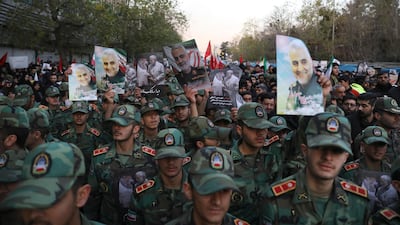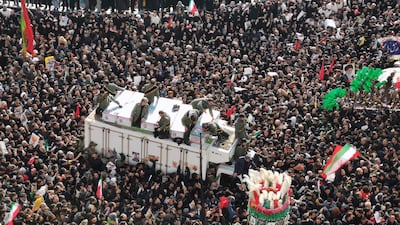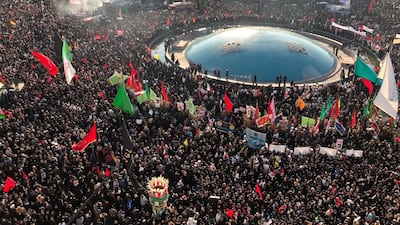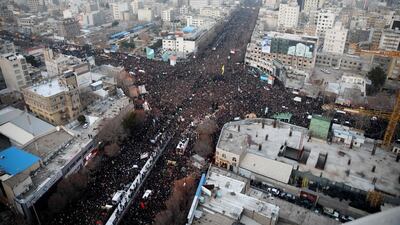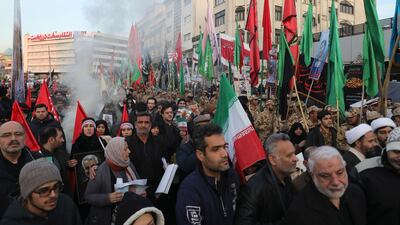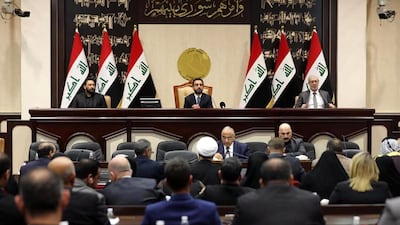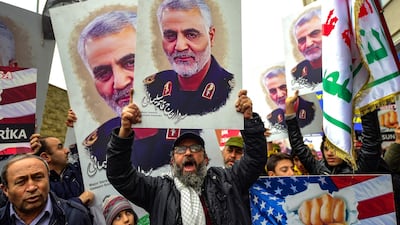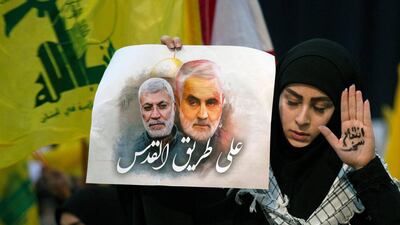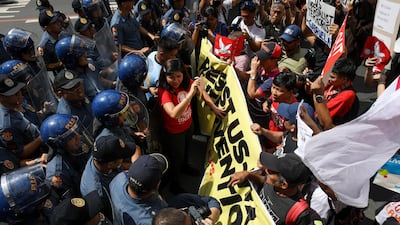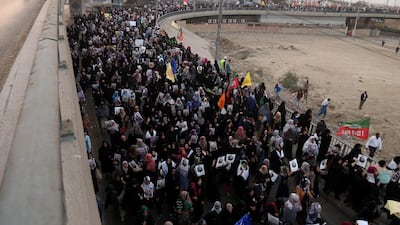Hezbollah leader Hassan Nasrallah recently described the assassinated Iranian Quds Force general Qassem Suleimani as a "dedicated warrior" and a "master strategist" who found a way to sway his audiences, whether fighters in the Iraqi desert or in meetings with Russian President Vladimir Putin at the Kremlin.
A year on from the US strike that killed Suleimani near Baghdad airport, experts say Iran is still reeling from the loss of its master strategist but also that the US has not established “the real deterrence” it had sought from the operation.
Suleimani was no average spymaster for Tehran.
He was the linchpin that connected Iran’s proxy networks from Baghdad to Sanaa. A fluent Arabic speaker, a ruthless military operator who expanded the Quds Force reach into Afghanistan, Iraq, Syria, Yemen and deep into Lebanon after the 2006 war between Hezbollah and Israel.
One year since his killing, one author who chronicled Suleimani’s life says he is irreplaceable and that Iran has acknowledged that.
"Qassem Suleimani has proven to be irreplaceable ... the regime [in Iran] has accepted that Suleimani was simply irreplaceable and has downgraded the position of Quds Force commander to more of a co-ordinator," says Arash Azizi, author of Shadow Commander: Soleimani, US and Iran's Global Ambition.
Brig Gen Ismail Qaani, Suleimani’s deputy, stepped into the role as head of the Quds Force, but has failed to pick up the many strands of Iranian influence in the region, including in exerting influence over Iraqi militias that his former boss cultivated and built.
"Not only [does] Qaani lack the charisma, when it comes to the personal relationship with Arab militias and the operational know-how he is no match for his predecessor," Mr Azizi tells The National.
“Suleimani was able to command a transnational army of thousands of soldiers; he famously was capable of having breakfast in Tehran, lunch in Baghdad and dinner in Beirut or Damascus,” the expert says.
Suleimani’s personal relations – the footage of him paying condolences to families of dead fighters, having tea with Arab tribes and counselling Hezbollah members – made him indispensable in that role.
“There were instances in which he went to Hezbollah's leadership and asked for a dozen field commanders to be sent to Iraq immediately. He could do this because he had a personal relationship with many of these people and because he was able to move seamlessly between the battlegrounds,” Mr Azizi says.
In contrast, Brig Gen Qaani has reportedly been to Iraq only twice in the past year and is under bigger financial constraints because of the effect of sanctions on Iran.
Still, the Iranian regime has managed to maintain its influence in other ways in areas that Suleimani commanded.
They have increased attacks on US interests in Iraq, maintained levers of power in Damascus and Beirut as well as continued to supply weapons to the Houthis in Yemen.
This runs against the Trump administration’s argument that the assassination of Suleimani would restore deterrence, curb Tehran from killing Americans and discourage Iran’s malign regional activities.
Ariane Tabatabai, a Middle East fellow at the Alliance For Securing Democracy at the German Marshall Fund, says she saw little to no change in Iranian behaviour in the year since the killing of Suleimani.
“We tend to forget that two Americans were killed [in a rocket attack in Iraq] back in March, and from the recent reporting, it doesn’t seem like the proxies are trying to minimise casualties in their attacks,” Ms Tabatabai says.
"None of that screams deterrence success ... and in terms of the impact of Suleimani's death for Iran, strategically, as we expected, there hasn't been a shift," says the author of No Conquest, No Defeat.
The expert acknowledges the operational void that Suleimani left, and that it has not been “smooth sailing” for Brig Gen Qaani.
But she also points out that the decision-makers in Tehran could be waiting Mr Trump out before deciding their next operational road map with a new administration.
Mark Dubowitz, chief executive at the Foundation for Defence of Democracies, says that in assassinating Suleimani, “the US removed Iran’s most feared and competent battlefield commander”.
Although, rather than a deterrence, he says “one must not underestimate the regime’s thirst for revenge but so far it has held back on the correct assumptions that Trump would respond severely and that Biden is committed to returning to the JCPOA and lifting the most powerful economic sanctions”.
But he says Iran could be miscalculating in assuming that president-elect Joe Biden would completely flip the table on Mr Trump’s strategy.
“The regime may calculate that it’s better to wait to first get hundreds of billions of dollars flowing into their coffers before launching any revenge attack to Suleimani’s killing, but they may also assume, wrongly, that a Biden administration would be less likely to respond to an attack against Americans,” Mr Dubowitz says.
The money that the expert is referencing would be from sanctions relief if the Biden administration agrees to return to the nuclear deal that Mr Trump abandoned in 2018.
Colin Clarke, a senior research fellow at The Soufan Centre, says he sees the argument of deterrence being weakened by Mr Trump's downsizing of the number of US troops in Iraq and withdrawing 500 personnel by January 15.
“As the US draws down its forces in Iraq, Iran is increasing its influence, which means that many Iran-backed Iraqi militias will be further emboldened,” Mr Clarke says.
“Iran still regularly attacks US interests in Iraq through its proxy forces, has grown its foreign fighter network throughout the region, still supplies Houthi rebels in Yemen with increasingly sophisticated weaponry, and Hezbollah remains among the most capable violent non-state actors in the world,” Mr Clarke says.
While the Suleimani killing may have derailed Iran operationally, the strategic long game of expanding its proxy influence and testing the Biden team is the one that looms large a year on from the assassination.



